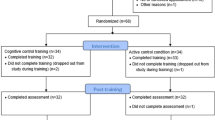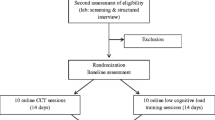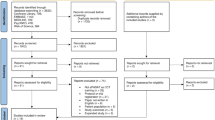Abstract
Background
The current study sets out to explore the influence of a well-studied cognitive control training (CCT) procedure on cognitive control processes, emotion regulation (ER) and self-reported affect in older adults.
Methods
Thirty-nine healthy older adults (aged 64–78) participated in a randomized controlled proof-of-concept trial. Twenty-one of these participants performed 10 sessions of CCT that loads on working memory and sustained attention, the other eighteen performed 10 sessions of an active placebo training.
Results
CCT beneficially impacted task-specific transfer, but the training did not result in transfer to an unrelated cognitive control task (Stroop task). In addition, no effects were observed on ER processes or affect changes immediately following training, nor at 6 weeks follow-up.
Conclusion
At this point, the CCT seems not suitable to enhance cognitive resilience factors in older non-depressed individuals. However, there is need for more research on possible moderators of the effects, as well as larger-scale studies with longer follow-up measurements.

Similar content being viewed by others
Notes
This study was part of a larger project, also investigating the relationship between ageing, proactive control and attentional bias. Therefore, the AX-CPT (measured before the intervention), the Behavior Rating Inventory of Executive Function (BRIEF, measured before and after the intervention) and the eye tracking task with emotional stimuli (measured after the intervention) were also collected but data will not be presented in the current manuscript. Analyses of the BRIEF revealed no effect of the intervention, completely in line with the reported null-finding in the current paper. Due to various technical reasons, we are unable to annotate each daily training data file to every specific participant during the home-based trainings sessions. Hence, the link between training performance and outcome measures could not be investigated.
References
Anguera, J. A., Gunning, F. M., & Arean, P. A. (2017). Improving late life depression and cognitive control through the use of therapeutic video game technology: A proof-of-concept randomized trial. Depression and Anxiety, 34(6), 508–517. https://doi.org/10.1002/da.22588.
Baier, B., Karnath, H. O., Dieterich, M., Birklein, F., Heinze, C., & Muller, N. G. (2010). Keeping memory clear and stable: The contribution of human basal ganglia and prefrontal cortex to working memory. Journal of Neuroscience, 30(29), 9788–9792. https://doi.org/10.1523/JNEUROSCI.1513-10.2010.
Botvinick, M. M., Braver, T. S., Barch, D. M., Carter, C. S., & Cohen, J. D. (2001). Conflict monitoring and cognitive control. Psychological Review, 108(3), 624–652. https://doi.org/10.1037/0033-295X.108.3.624.
Braver, T. S., Paxton, J. L., Locke, H. S., & Barch, D. M. (2009). Flexible neural mechanisms of cognitive control within human prefrontal cortex. Proceedings of the National Academy of Sciences United States of America, 106(18), 7351–7356. https://doi.org/10.1073/pnas.0808187106.
Brunoni, A. R., Boggio, P. S., De Raedt, R., Bensenor, I. M., Lotufo, P. A., Namur, V., et al. (2014). Cognitive control therapy and transcranial direct current stimulation for depression: A randomized, double-blinded, controlled trial. Journal of Affective Disorders, 162, 43–49. https://doi.org/10.1016/j.jad.2014.03.026.
Cabeza, R., & Dennis, N. A. (2013). Frontal lobes and aging: Deterioration and compensation. In D. T. Stuss & R. T. Knight (Eds.), Principles of frontal lobe function (2nd ed., pp. 628–652). New York: Oxford University Press.
De Raedt, R., & Koster, E. H. (2010). Understanding vulnerability for depression from a cognitive neuroscience perspective: A reappraisal of attentional factors and a new conceptual framework. Cognitive, Affective, & Behavioral Neuroscience, 10(1), 50–70. https://doi.org/10.3758/CABN.10.1.50.
Devilly, G. J., & Borkovec, T. D. (2000). Psychometric properties of the credibility/expectancy questionnaire. Journal of Behavior Therapy and Experimental Psychiatry, 31(2), 73–86. https://doi.org/10.1016/S0005-7916(00)00012-4.
Garnefski, N., Kraaij, V., & Spinhoven, P. (2001). Negative life events, cognitive emotion regulation and emotional problems. Personality and Individual Differences, 30(8), 1311–1327. https://doi.org/10.1016/S0191-8869(00)00113-6.
Gross, J. J., & Thompson, R. A. (2007). Emotion regulation: Conceptual foundations. New York: Guilford.
Guye, S., Röcke, C., Mérillat, S., von Bastian, C. C., & Martin, M. (2016). Adult lifespan. In T. Strobach & J. Karbach (Eds.), Cognitive training: An overview of features and applications (pp. 45–57). Cham: Springer.
Hammes, J. G. W. (1978). Stroop kleur-woord Test: Dutch manual. Lisse: Swets & Zeitlinger BV.
Hoorelbeke, K., & Koster, E. H. W. (2017). Internet-delivered cognitive control training as a preventive intervention for remitted depressed patients: Evidence from a double-blind randomized controlled trial study. Journal of Consulting and Clinical Psychology, 85(2), 135–146. https://doi.org/10.1037/ccp0000128.
Hoorelbeke, K., Koster, E. H. W., Vanderhasselt, M. A., Callewaert, S., & Demeyer, I. (2015). The influence of cognitive control training on stress reactivity and rumination in response to a lab stressor and naturalistic stress. Behaviour Research and Therapy, 69, 1–10. https://doi.org/10.1016/j.brat.2015.03.010.
Hoorelbeke, K., Koster, E. H. W., Demeyer, I., Loeys, T., & Vanderhasselt, M. A. (2016). Effects of cognitive control training on the dynamics of (Mal) adaptive emotion regulation in daily life. Emotion, 16(7), 945–956. https://doi.org/10.1037/emo0000169.
Joormann, J. (2010). Cognitive inhibition and emotion regulation in depression. Current Directions in Psychological Science, 19(3), 161–166. https://doi.org/10.1177/0963721410370293.
Koster, E., Hoorelbeke, K., Onraedt, T., Owens, M., & Derakshan, N. (2017). Cognitive control interventions for depression: A systematic review of findings from training studies. Clinical Psychology Review, 53, 79–92.
Liang, Y., Huo, M., Kennison, R., & Zhou, R. (2017). The role of cognitive control in older adult cognitive reappraisal: Detached and positive reappraisal. Frontiers in Behavioral Neuroscience, 11, 27. https://doi.org/10.3389/fnbeh.2017.00027.
Matysiak, O., Kroemeke, A., & Brzezicka, A. (2019). Working memory capacity as a predictor of cognitive training efficacy in the elderly population. Frontiers in Aging Neuroscience, 11, 126.
McGuire, J. T., & Botvinick, M. M. (2010). Prefrontal cortex, cognitive control, and the registration of decision costs. Proceedings of the National Academy of Sciences United states of America, 107(17), 7922–7926. https://doi.org/10.1073/pnas.0910662107.
Mella, N., Fagot, D., Renaud, O., Kliegel, M., & De Ribaupierre, A. (2018). Individual differences in developmental change: Quantifying the amplitude and heterogeneity in cognitive change across old age. Journal of Intelligence. https://doi.org/10.3390/jintelligence6010010.
Motter, J. N., Pimontel, M. A., Rindskop, D., Devanand, D. P., Murali Doraiswamy, P., & Sneed, J. R. (2016). Computerized cognitive training and functional recovery in major depressive disorder: A meta-analysis. Journal of Affective Disorders, 189, 184–191.
Nguyen, L., Murphy, K., & Andrews, G. (2019). Immediate and long-term efficacy of executive functions cognitive training in older adults: A systematic review and meta-analysis. Psychological Bulletin, 145(7), 698–733. https://doi.org/10.1037/bul0000196.
Ochsner, K. N., & Gross, J. J. (2005). The cognitive control of emotion. Trends in Cognitive Sciences, 9(5), 242–249. https://doi.org/10.1016/j.tics.2005.03.010.
Orlov, N. D., Tracy, D. K., Joyce, D., Patel, S., Rodzinka-Pasko, J., Dolan, H., et al. (2017). Stimulating cognition in schizophrenia: A controlled pilot study of the effects of prefrontal transcranial direct current stimulation upon memory and learning. Brain Stimulation, 10(3), 560–566. https://doi.org/10.1016/j.brs.2016.12.013.
Peckham, A. D., & Johnson, S. L. (2018). Cognitive control training for emotion-related impulsivity. Behaviour Research and Therapy, 105, 17–26. https://doi.org/10.1016/j.brat.2018.03.009.
Raz, N., Lindenberger, U., Rodrigue, K. M., Kennedy, K. M., Head, D., Williamson, A., et al. (2005). Regional brain changes in aging healthy adults: General trends, individual differences and modifiers. Cerebral Cortex, 15(11), 1676–1689. https://doi.org/10.1093/cercor/bhi044.
Remue, J., Vanderhasselt, M. A., Baeken, C., Rossi, V., Tullo, J., & De Raedt, R. (2016). The effect of a single HF-rTMS session over the left DLPFC on the physiological stress response as measured by heart rate variability. Neuropsychology, 30(6), 756–766. https://doi.org/10.1037/neu0000255.
Ruf, S. P., Fallgatter, A. J., & Plewnia, C. (2017). Augmentation of working memory training by transcranial direct current stimulation (tDCS). Science Reports, 7(1), 876. https://doi.org/10.1038/s41598-017-01055-1.
Sanchez-Lopez, A., Vanderhasselt, M. A., Allaert, J., Baeken, C., & De Raedt, R. (2018). Neurocognitive mechanisms behind emotional attention: Inverse effects of anodal tDCS over the left and right DLPFC on gaze disengagement from emotional faces. Cognitive, Affective, & Behavioral Neuroscience, 18(3), 485–494. https://doi.org/10.3758/s13415-018-0582-8.
Siegle, G. J., Ghinassi, F., & Thase, M. E. (2007). Neurobehavioral therapies in the 21st century: Summary of an emerging field and an extended example of cognitive control training for depression. Cognitive Therapy and Research, 31(2), 235–262. https://doi.org/10.1007/s10608-006-9118-6.
Siegle, G. J., Price, R. B., Jones, N. P., Ghinassi, F., Painter, T., & Thase, M. E. (2014). You gotta work at it. Clinical Psychological Science, 2(4), 455–471. https://doi.org/10.1177/2167702614536160.
Treynor, W., Gonzalez, R., & Nolen-Hoeksema, S. (2003). Rumination reconsidered: A psychometric analysis. Cognitive Therapy and Research, 27, 247–259. https://doi.org/10.1023/A:1023910315561.
Vanderhasselt, M. A., Baeken, C., Van Schuerbeek, P., Luypaert, R., De Mey, J., & De Raedt, R. (2013a). How brooding minds inhibit negative material: An event-related fMRI study. Brain and Cognition, 81(3), 352–359. https://doi.org/10.1016/j.bandc.2013.01.007.
Vanderhasselt, M. A., Brunoni, A. R., Loeys, T., Boggio, P. S., & De Raedt, R. (2013b). Nosce te ipsum: Socrates revisited? Controlling momentary ruminative self-referent thoughts by neuromodulation of emotional working memory. Neuropsychologia, 51(13), 2581–2589. https://doi.org/10.1016/j.neuropsychologia.2013.08.011.
Vanderhasselt, M. A., Koster, E. H. W., Onraedt, T., Bruyneel, L., Goubert, L., & De Raedt, R. (2014). Adaptive cognitive emotion regulation moderates the relationship between dysfunctional attitudes and depressive symptoms during a stressful life period: A prospective study. Journal of Behavior Therapy and Experimental Psychiatry, 45(2), 291–296. https://doi.org/10.1016/j.jbtep.2014.01.003.
Vanderhasselt, M. A., De Raedt, R., Namur, V., Lotufo, P. A., Bensenor, I. M., Boggio, P. S., et al. (2015). Transcranial electric stimulation and neurocognitive training in clinically depressed patients: A pilot study of the effects on rumination. Progress in Neuro-Psychopharmacology and Biological Psychiatry, 57, 93–99. https://doi.org/10.1016/j.pnpbp.2014.09.015.
Vervaeke, J., Hoorelbeke, K., Baeken, C., Van Looy, J., & Koster, E. H. W. (2019). Transfer and motivation after cognitive control training for remitted depression in healthy sample. Journal of Cognitive Enhancement, 4(1), 49–61. https://doi.org/10.1007/s41465-019-00135-6.
Watson, D., Clark, L. A., & Tellegen, A. (1988). Development and validation of brief measures of positive and negative affect: The PANAS scales. Journal of Personality and Social Psychology, 54(6), 1063–1070. https://doi.org/10.1037//0022-3514.54.6.1063.
Zetsche, U., Burkner, P. C., & Schulze, L. (2018). Shedding light on the association between repetitive negative thinking and deficits in cognitive control: A meta-analysis. Clinical Psychology Review, 63, 56–65. https://doi.org/10.1016/j.cpr.2018.06.001.
Acknowledgements
The authors would like to thank the participants for their willingness to take part in this study. This research was supported by the Research Foundation Flanders (Grant 3G015614, awarded to RDR and MAV). Preparation of this paper was also supported by Grant BOF16/GOA/017 for a Concerted Research Action of Ghent University (awarded to RDR) and a grant BOFSTA2017002501 for research at Ghent University (awarded to MAV). The authors report no conflicts of interest, either financial or scholarly. Neither funding source had any influence on the design or results of the study.
Author information
Authors and Affiliations
Corresponding author
Ethics declarations
Conflict of Interest
Marie-Anne Vanderhasselt, Ineke Demeyer, Leila Van Imschoot, Kristof Hoorelbele, and Rudi De Raedt, declare that they have no conflict of interest.
Ethical Approval
The study received ethical approval from the Ethics Committee of the Ghent University Faculty of Psychology and Educational Sciences. All procedures performed in the study involving human participants were in accordance with the ethical standards of the ethics committee, and with the 1964 Helsinki declaration and its later amendments or comparable ethical standards.
Informed Consent
Informed consent was obtained from all individual participants included in the study.
Animal Rights
No animal studies were carried out by the authors for this article.
Additional information
Publisher's Note
Springer Nature remains neutral with regard to jurisdictional claims in published maps and institutional affiliations.
Rights and permissions
About this article
Cite this article
Vanderhasselt, MA., Demeyer, I., Van Imschoot, L. et al. Cognitive Control Training in Healthy Older Adults: A Proof of Concept Study on the Effects on Cognitive Functioning, Emotion Regulation and Affect. Cogn Ther Res 45, 959–968 (2021). https://doi.org/10.1007/s10608-020-10154-9
Accepted:
Published:
Issue Date:
DOI: https://doi.org/10.1007/s10608-020-10154-9




